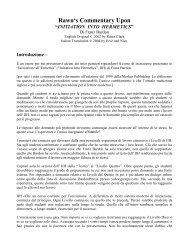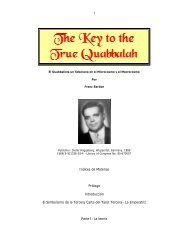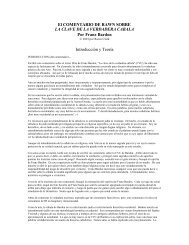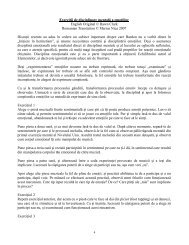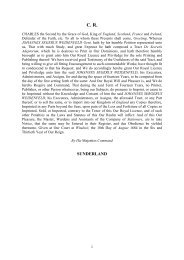Hermetic Philosophy and Alchemy - A Bardon Companion
Hermetic Philosophy and Alchemy - A Bardon Companion
Hermetic Philosophy and Alchemy - A Bardon Companion
Create successful ePaper yourself
Turn your PDF publications into a flip-book with our unique Google optimized e-Paper software.
Greeks, <strong>and</strong> some inscrutable hieroglyphics are still to be found quoted in certain of the alchemical<br />
records: but the originals are entirely swept away. And, duly considering all that is related by the<br />
chroniclers of that ancient dynasty, her amazing reputation for power, wealth, wisdom, <strong>and</strong> magic<br />
skill; --- <strong>and</strong>, even when all these had faded, when Herodotus visited the city, after the priestly<br />
government of the Pharoahs had been overthrown by Cambyses, <strong>and</strong> that savage conqueror had<br />
burned the temples <strong>and</strong> almost annihilated the sacerdotal order, --- after the influx of strangers had<br />
been permitted, <strong>and</strong> civil war had raged almost to the fulfillment of the Asclepian prophecy, --- the<br />
wonders then recorded by the historian of her remaining splendor <strong>and</strong> magnificence; --- what shall we<br />
now conclude, when, after the lapse of many more destroying ages, we review the yet mightily<br />
surviving witnesses of so much glory, surpassing <strong>and</strong> gigantic even in the last stage of their decay?<br />
Shall we suppose the ancient accounts fallacious because they are too wonderful to be conceived; or<br />
have we not now present before our eyes the plain evidence of lost science <strong>and</strong> the vestiges of an<br />
intelligence superior to our own? For what did the nations flock to Memphis? For what did<br />
Pythagoras, Thales, Democritus, <strong>and</strong> Plato become immured there for several solitary years, but to be<br />
initiated in the wisdom <strong>and</strong> learning of those Egyptians? For what else, but for the knowledge of that<br />
mighty Art with which she arose, governed, <strong>and</strong> dazzled the whole contemporary world; holding in<br />
strong abeyance the ignorant, profane, vulgar, until the evil day of desolation came with self-abuse,<br />
when, neglecting to obey the law, by which she governed, all fell, as was foretold, <strong>and</strong> sinking<br />
gradually deeper in crime <strong>and</strong> presumption, was at last annihilated, <strong>and</strong> every sacred institution<br />
violated by barbarians, <strong>and</strong> despoiled? "Oh, Egypt! Egypt! Fables alone shall remain of thy religion,<br />
<strong>and</strong> these such as will be incredible to posterity, <strong>and</strong> words alone shall be left engraved in stones<br />
narrating thy pious deeds. The Scythian also, or Indian, or some other similar nation, shall inhabit<br />
Egypt. For divinity shall return to heaven, all its inhabitants shall die, <strong>and</strong> thus Egypt bereft both of<br />
God <strong>and</strong> man shall be deserted. Why do you weep, O Asclepias? Egypt shall experience yet more<br />
ample evils; she was once holy, <strong>and</strong> the greatest lover of the gods on earth, by the desert of her<br />
religion. And she, who was alone the reductor of sanctity <strong>and</strong> the mistress of piety, will be an example<br />
of the greatest cruelty. And darkness shall be preferred to light, <strong>and</strong> death shall be judged to be more<br />
useful than life. No one shall look up to heaven. The religious man shall be counted insane; the<br />
irreligious shall be thought wise; the furious, brave; <strong>and</strong> the worst of men shall be considered good.<br />
For the soul, <strong>and</strong> all things about it, by which it is either naturally immortal, or conceives it shall attain<br />
to immortality, conformable to what I have explained to you, shall not only be the subjects of laughter,<br />
but shall be considered as vanity. Believe me, likewise, that a capital punishment shall be appointed<br />
for him who applies himself to the Religion of Intellect. New statutes <strong>and</strong> new laws shall be<br />
established, <strong>and</strong> nothing religious, or which is worthy of heaven or celestial concerns, shall be heard or<br />
believed in the mind. Every divine voice shall, by a necessary silence, be dumb: the fruits of the earth<br />
shall be corrupted; <strong>and</strong> the air itself shall languish with a sorrowful stupor. These events, <strong>and</strong> such an<br />
old age of the world as this, shall take place --- such irreligion, inordination, <strong>and</strong> unseasonableness of<br />
all good" (11).<br />
Such is the substance of a prediction which, as it was supposed to have reference to the Christian era,<br />
has been abused <strong>and</strong> reputed a forgery by the faithless learned of modern times. It is, however,<br />
difficult to conceive why it should have been considered so obnoxious, for the early history of<br />
Christianity certainly does not fulfill it; it was a falling off from Divinity tha was predicted, <strong>and</strong> not<br />
such a revival as took place upon the teachings of Jesus Christ <strong>and</strong> his apostles. At that period<br />
philosophy too flourished, <strong>and</strong> the Spirit of the Word was potent in faith to heal <strong>and</strong> save. If the<br />
prediction had been a forgery of Apuleius, or other contemporary opponent of Christianity, the early<br />
fathers must have known it, which they did not as is plain from Lactantius, <strong>and</strong> St Augustine<br />
mentioning, without expressing any doubt about its authenticity; <strong>and</strong> though the latter (then adopting<br />
probably the popular notion) esteemed it instinctu fallacies spiritus (12), he might subsequently<br />
perhaps have thought otherwise, had he lived so long. Christianity was yet in his time glowing, bright,<br />
efficacious, from the Divine Fountain; faith was then grounded in reality <strong>and</strong> living operation, <strong>and</strong> the<br />
mystery of human regeneration, so zealously proclaimed, was also rationally understood. The<br />
fulfillment, with respect to Egypt, appears to have taken place in part long previously, <strong>and</strong> in part to<br />
have been reserved to later times, when sacred mysteries, too openly exposed to the multitude, became<br />
perverted <strong>and</strong> vilified by their abuse.




![Magie de YHVH-ADNY et Archeus[1]](https://img.yumpu.com/16926522/1/190x245/magie-de-yhvh-adny-et-archeus1.jpg?quality=85)
